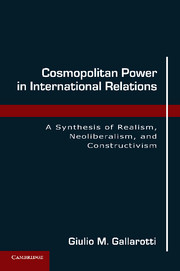 Cosmopolitan Power in International Relations
Cosmopolitan Power in International Relations Book contents
- Frontmatter
- Contents
- Preface
- Introduction
- 1 The Theory of Cosmopolitan Power
- 2 Crucial-Case Textual Analysis of the Founding Fathers of Realism
- 3 Crucial-Case Textual Analysis of the Founding Fathers of Realism
- 4 Case Studies of Soft Empowerment
- 5 Case Study of Hard Disempowerment
- 6 Case Study of Soft Empowerment
- 7 Conclusions
- Appendix Formal Model of Cosmopolitan Power
- References
- Index
3 - Crucial-Case Textual Analysis of the Founding Fathers of Realism
The Modern Inspirations
Published online by Cambridge University Press: 05 June 2012
- Frontmatter
- Contents
- Preface
- Introduction
- 1 The Theory of Cosmopolitan Power
- 2 Crucial-Case Textual Analysis of the Founding Fathers of Realism
- 3 Crucial-Case Textual Analysis of the Founding Fathers of Realism
- 4 Case Studies of Soft Empowerment
- 5 Case Study of Hard Disempowerment
- 6 Case Study of Soft Empowerment
- 7 Conclusions
- Appendix Formal Model of Cosmopolitan Power
- References
- Index
Summary
Continuing in the crucial-case textual assessment of the theory of Cosmopolitan power undertaken in the great works of Realism, attention is now turned to the modern works that most inspired contemporary Realist thinking in international relations: E. H. Carr's The Twenty Years’ Crisis 1919–1939 and Hans Morgenthau's Politics among Nations. As in the cases of the classical Realists, it would be all too easy to cull passages from Carr and Morgenthau's other works and proclaim them anything but precursors to contemporary Realists that venerate the role of hard power in international relations. Assessing many of Carr's other works might brand him a flaming Utopian or an anti-Realist – the very ideologies he vehemently condemns as naive in passages of his famous The Twenty Years’ Crisis 1919–1939. According to his autobiography (Carr 2000, xix), Carr became disillusioned with Realism with the advent of World War II and went on to write two books that he called “Utopian” in nature: Conditions of Peace and Nationalism and After. Yet this would hardly raise any questions about his acclaimed articulation of the need for national leaders to consider the importance of hard power (and not be blinded by the lure of Utopianism) in forging a stable peace in his magnum opus The Twenty Years’ Crisis 1919–1939, which has remained a principal vindication of hard power politics.
Morgenthau too could be an easy target of drastic revisionism if his other writings were considered. His Scientific Man Versus Power Politics (1967) exhibits strong elements of post-positivism and theology. In many ways, his indictment of secularity, rationalism, and science cuts at the epistemological foundations of Realpolitik. He writes that the exaggerated hope in the social healing powers of modern reason and science “has left man the poorer and made the burden of life harder to bear” (125). Indeed, modernity has repressed the emotional and religious side of humanity, leaving it in an inferior state. Developing the logical implications of this book could easily make a case for Morgenthau as a Constructivist or Postmodernist.
- Type
- Chapter
- Information
- Cosmopolitan Power in International RelationsA Synthesis of Realism, Neoliberalism, and Constructivism, pp. 126 - 155Publisher: Cambridge University PressPrint publication year: 2010


